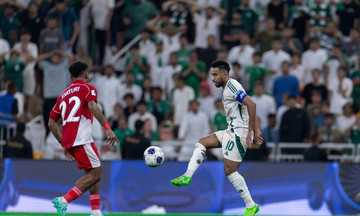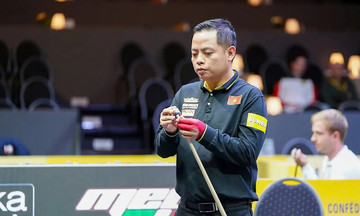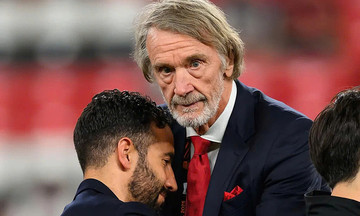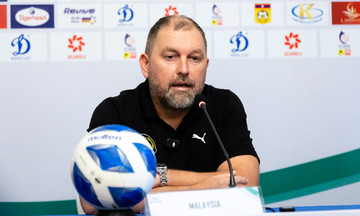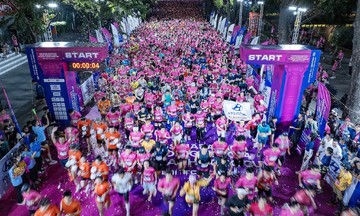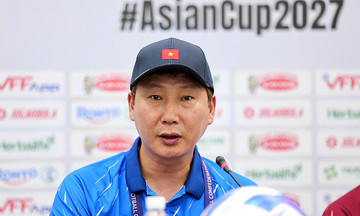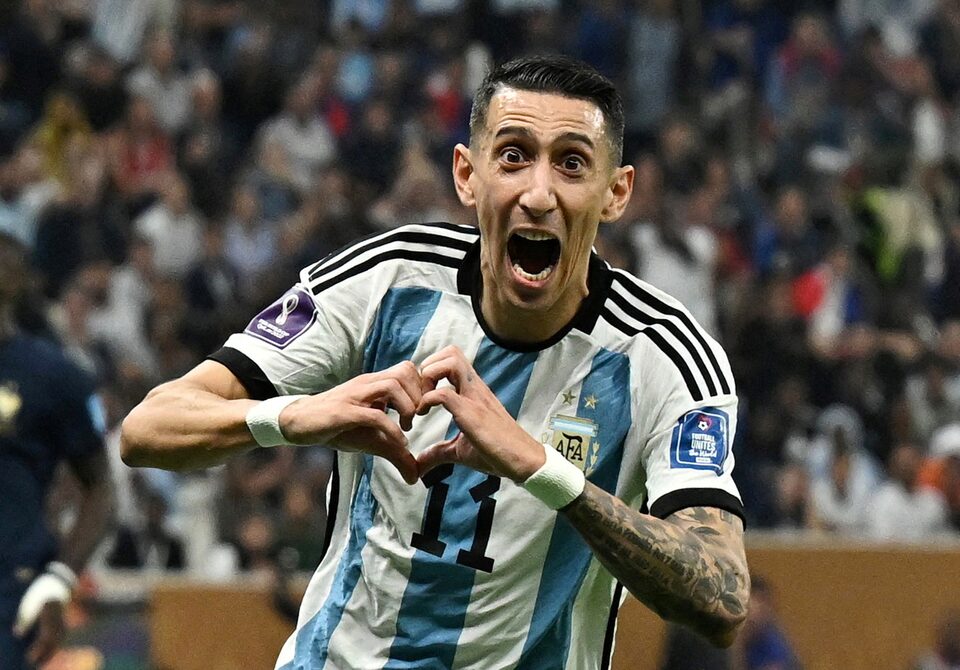 |
Di Maria celebrates after scoring in the 2022 World Cup final between Argentina and France on 18/12/2022. Photo: Reuters |
Di Maria celebrates after scoring in the 2022 World Cup final between Argentina and France on 18/12/2022. Photo: Reuters
Sitting in an armchair at Rosario Central's training center, a few kilometers from Rosario, Di Maria, who has retired from European football and the Argentina national team, smiled as he recounted a story from his first few months back home.
"Everyone recognizes my truck now; the fans spot me instantly," he admitted with a mix of resignation and amusement. The "truck" he referred to was his black car. "One day, I went to my sister's house near Central's stadium. I was taking the kids to the movies when a motorcycle passed by. It circled back, passed again, and finally stopped to knock on my window. I rolled it down, and the person said, 'I recognized you by your license plate!' They even know my license plate! So, we took a picture together. It shows you the passion, almost obsession, of Argentine fans."
Di Maria's return to Rosario Central was delayed last year due to threats from Argentine gangs warning him not to return. He was asked how he manages security and if he has taken precautions or hired bodyguards.
He explained that he handles his own security and lives normally. He told Rosario Central's President, Gonzalo Belloso, that he wanted to return to play and live an ordinary life, going out, doing everyday things. He didn't want to be confined within four walls. He added that he can discern genuine fan affection from suspicion and feels secure.
Now a full-time Rosario resident, Di Maria shared his perspective on the city and Argentina after previously only visiting. He said that news reports abroad often exaggerate the severity of the situation. While acknowledging the presence of violence and crime, he emphasized that it's amplified in foreign media. He chooses to remain calm and adapt to the current state of the country.
Di Maria discussed fulfilling his long-held dream of returning to Rosario Central. He expressed immense happiness and satisfaction, emphasizing the challenges he overcame. Returning to Argentina was the only option, a desire shared by his daughters and family. Being at Central, training there, traveling to matches on the team bus, seeing the fans everywhere, wearing the jersey again, and playing completed the circle.
He was asked if he expected the enthusiastic reception he received, even when playing away from Rosario Central's home stadium, Gigante de Arroyito. He admitted surprise at the overwhelming support, even in away games like those in Lanus or Tucuman. He believes it reflects the magnitude of the national team's achievements, which resonated deeply with fans.
When asked if the outpouring of affection makes him question past criticism, Di Maria said he holds no resentment. He attributes the past difficulties to a complex aspect of Argentine culture, a tendency to tease or challenge each other. He would willingly endure it all again for the love he currently receives.
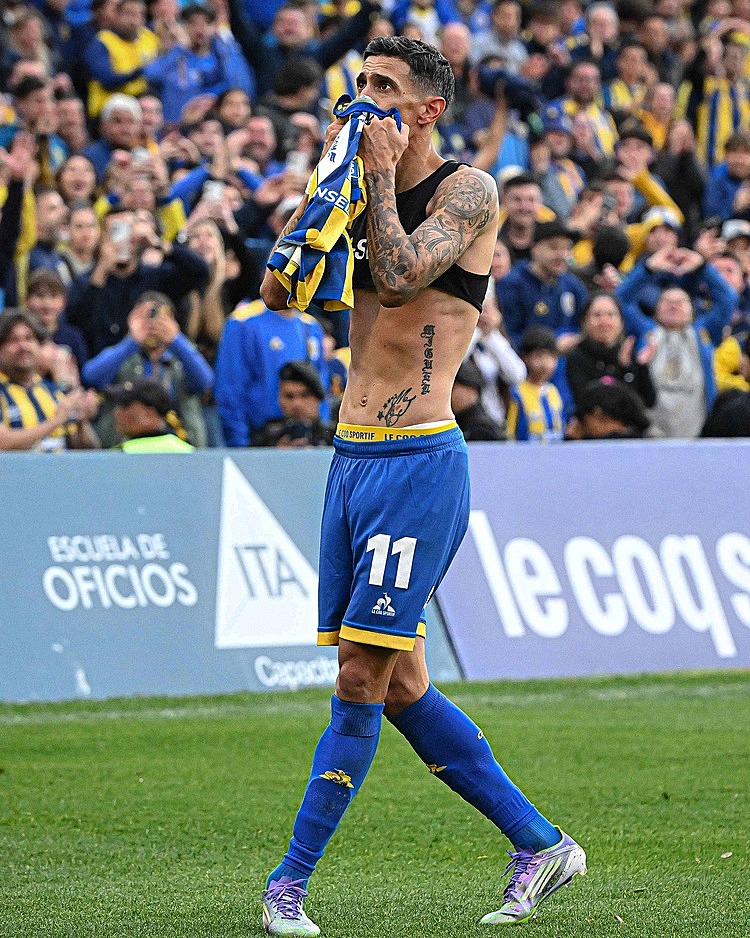 |
Di Maria returned to play for Rosario Central in May, after 18 years playing abroad for 5 different clubs. Photo: AP |
Di Maria returned to play for Rosario Central in May, after 18 years playing abroad for 5 different clubs. Photo: AP
Di Maria discussed his adaptation to Argentine football. He felt no difficulty adjusting to the playing style, despite some suggesting he needed time. While the dry pitches presented a slight challenge, he was prepared for the physicality of the league. He noted that the lack of wins for his team has led to increased scrutiny, highlighting the competitive nature of Argentine football.
Reflecting on his previous statement about making history but not becoming legends after losing finals in 2014, 2015, and 2016, Di Maria acknowledged that was his feeling at the time. He felt they'd made history by reaching three major finals, reviving fan faith and excitement. However, their ultimate victory cemented their legendary status.
Di Maria discussed his daughters' smooth transition to life in Argentina. They quickly made friends, joined activities like volleyball and hockey, and adapted seamlessly to their new environment. He contrasted this with the perception that it would be difficult after years abroad, emphasizing the ease of returning home.
He shared an anecdote about a recent dinner with friends, where his mother babysat his children. He described the simple joy of this everyday occurrence, highlighting the normalcy he now enjoys.
He addressed the initial shock of his presence at his children's school, which subsided as everyone adjusted. Even in his neighborhood, interactions have become more casual, with neighbors simply waving hello instead of seeking photos. He understands the initial excitement but appreciates the return to normalcy.
Describing his parenting style, Di Maria admitted to being the stricter parent, while his wife, Jorgelina, is more relaxed. Both coming from modest backgrounds, they want to provide their children with everything but emphasize responsibility and the value of hard work. He shared examples of supporting his daughters' interests in sports while reminding them of their privileged position.
Regarding his 11-year-old daughter Mia's significant Instagram following, Di Maria acknowledged the challenges of parenting in the age of social media. While they don't manage her account, they monitor her activity closely. Mia understands the platform's nuances and seeks their approval before posting. He anticipates similar, but perhaps slightly more challenging, experiences with his younger daughter, Pia.
Di Maria explained the meaning behind his heart-shaped hand gesture celebration. It originated when he moved to Benfica in 2007. Jorgelina initially hesitated to join him in Lisbon but ultimately made the trip. His first goal for Benfica, celebrated with the heart gesture towards her, became a symbol of her support and a good luck charm.
Di Maria spoke highly of Jorgelina, describing her as his everything and emphasizing her unwavering support, especially during difficult times. He appreciates her defending him publicly, acting as his voice when he couldn't express himself as a player. He acknowledges her strong personality and confirms that he supports her public statements.
He admitted to advising Jorgelina to temper her responses at times, particularly when emotions run high. He recognizes the burden she carried, enduring difficult periods while he could find solace on the field. He believes social media provides an outlet for expressing and releasing pent-up emotions.
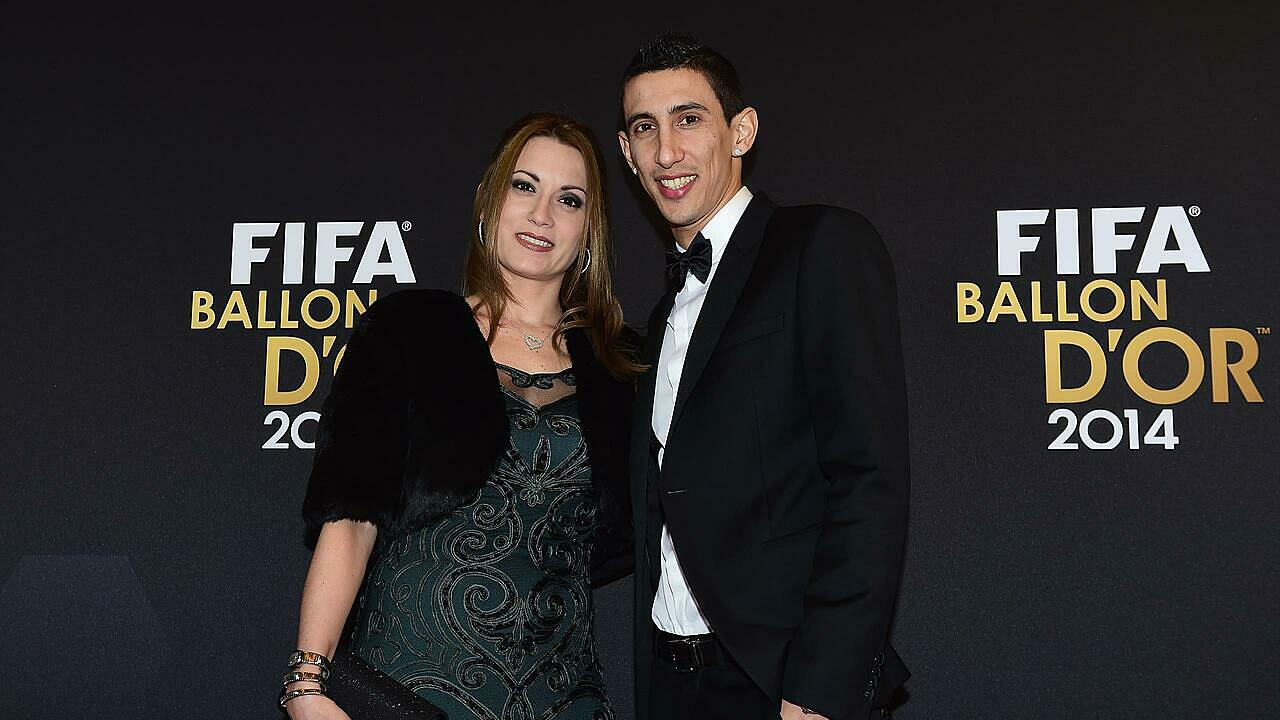 |
Di Maria and his wife Jorgelina at the 2014 Ballon d'Or ceremony. |
When asked about two other women in his life, Diana and "Graciela," Di Maria clarified that Diana is his mother and "Graciela" was the brand name of his childhood yellow bicycle, which his mother used to take him to practice. He reminisced about the bicycle's significance, its eventual theft, and the memories it evokes. He expressed gratitude for being able to live near his mother now.
Di Maria revealed that out of his close childhood friends, only one supports Newell’s Old Boys, Rosario Central's city rivals. The rest are Central supporters. He emphasized that their friendship transcends their differing club allegiances, even during derby matches.
At 37, Di Maria avoids thinking about his future after football, preferring to focus on the present. While pursuing a coaching course at the Argentine Football Coaches Association (ATFA), he's unsure when he'll transition into coaching. He acknowledges the demanding nature of coaching and hasn't decided on his post-playing career.
Regarding Messi's participation in the 2026 World Cup, Di Maria believes Messi must play, regardless of circumstances. He likens Messi to Diego Maradona, describing them as unique, otherworldly figures who elevate the team and inspire hope. He urges fans to cherish the opportunity to watch Messi play, even subscribing to MLS coverage just to see him in action for Inter Miami.
Addressing concerns about Messi and De Paul playing in the MLS, a league perceived as lower quality, Di Maria dismissed any negative impact on the national team. He emphasized that players ultimately compete against themselves, setting their own standards. He pointed to Messi's continued high performance and competitive spirit in the MLS as evidence of his commitment. He believes national team coach Lionel Scaloni values consistent playing time and strong performances, regardless of league.
Di Maria explained how the national team environment prevents complacency despite achieving significant success. The connection between fans and players, established after winning the 2021 Copa America, fuels their drive. He highlighted the passion surrounding the team and the pressure of representing 40 million Argentinians.
He attributed Scaloni's success to his unwavering loyalty to the Argentina national team, prioritizing the team over individual players. This approach, demonstrated through consistent team selections based on form, prevents complacency and fosters a competitive environment.
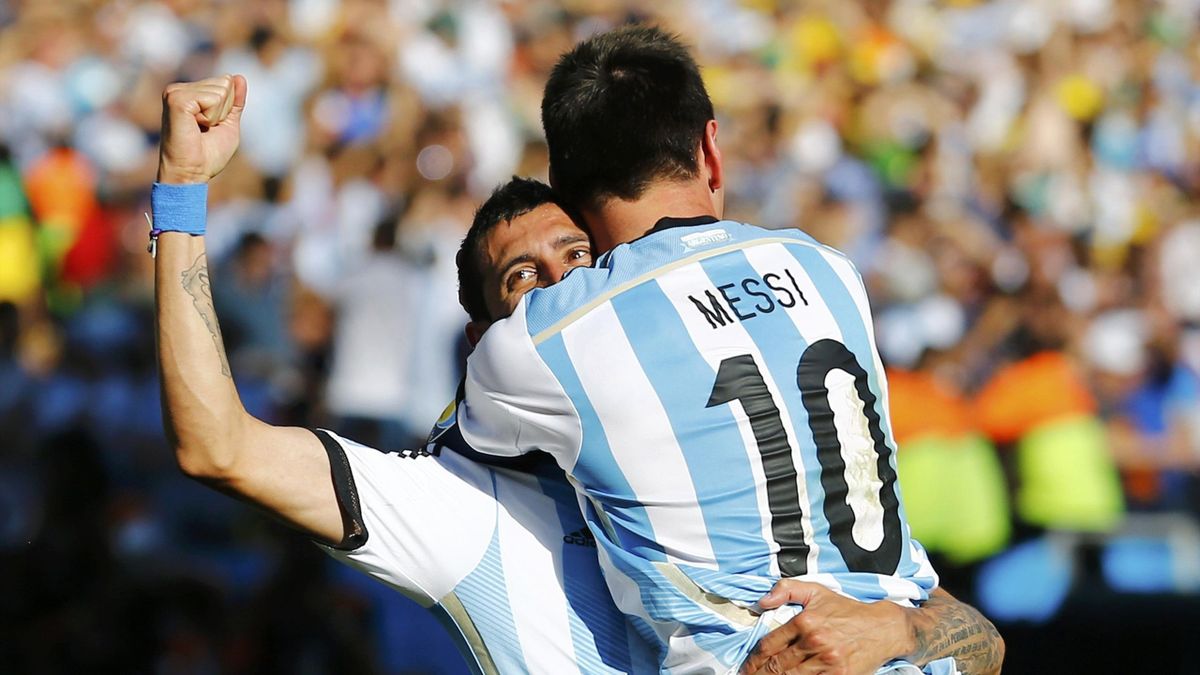 |
Di Maria and Messi during their time together on the Argentina national team. Photo: Reuters |
Di Maria and Messi during their time together on the Argentina national team. Photo: Reuters
Di Maria described the bittersweet experience of watching the national team as a fan. While it's difficult to watch from afar, he's content with his decision to retire and happy to see the younger players maintain the team's spirit. He's excited about the upcoming World Cup, noting the continued passion of veteran players and the emergence of young talents like Mastantuono.
On Mastantuono, the first Argentine player signed by Real Madrid since Di Maria's departure, he expressed hope for his success, highlighting the unique opportunity of playing for Real Madrid and encouraging him to make the most of it.
When asked to name five important players in Argentina's history, Di Maria chose Messi, Maradona, and Kempes. For the remaining two, he struggled but selected Passarella and De Paul, emphasizing De Paul's vital role in the team's dynamic, both on and off the field.
Humbly responding to suggestions that he belongs among the top five, Di Maria stated that his achievements and current life are his greatest rewards. He's content with the fans' affection, regardless of his ranking.
Di Maria and Lionel Messi were born just 235 days apart at the same hospital in Rosario, but their paths never crossed during their early years playing for local clubs. Di Maria explained that he wasn't aware of Messi until he gained media attention as a young prospect at Barcelona. Their first encounter was at the 2008 Beijing Olympics, marking the beginning of their shared journey to football glory.
Hoang Thong (La Nacion)




